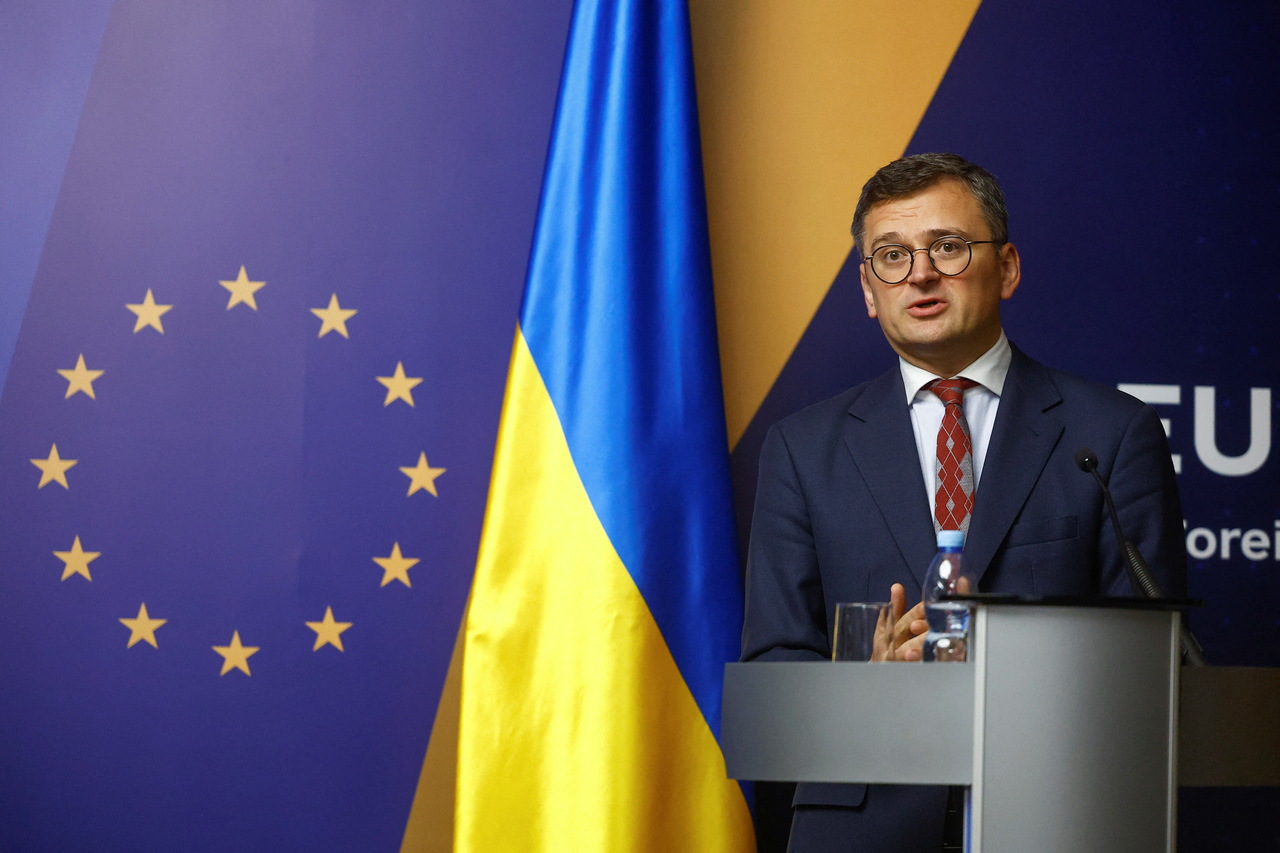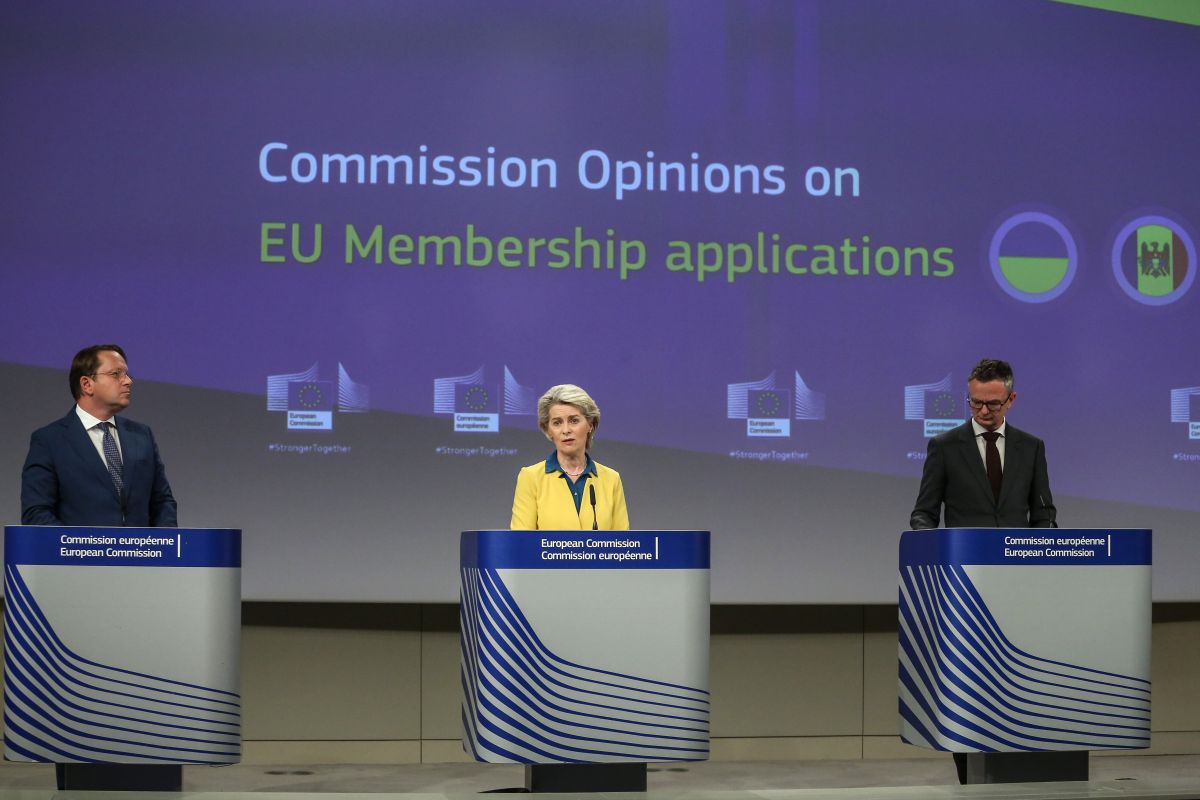Ukraine on the Brink of EU Accession Negotiations
Ukraine has made a range of preparations on its path to EU accession but is still a long way from fulfilling the membership obligations and must continue the reforms. Its weak economic condition, stemming from the ongoing war with Russia, will particularly be a problem. While the European Commission’s positive recommendation this month paves the way for the formal start of accession talks with Ukraine before the end of this year, it will also require a unanimous decision by the EU Member States at the European Council meeting in December.
 VALENTYN OGIRENKO / Reuters / Forum
VALENTYN OGIRENKO / Reuters / Forum
On 8 November, the European Commission (EC) recommended that the Member States open accession negotiations with Ukraine, referring to its implementation of more than 90% of the reforms indicated last June when it was granted candidate status for membership. At the same time, the EC asks them to hold off on adopting a negotiating framework—a document setting out guidelines and principles for the accession talks—until Ukraine has fully completed the reforms. The effective start of accession negotiations will therefore depend on Ukraine’s progress in the fight against corruption, reduction in the role of the oligarchs, and changes to the legislation on national minorities.
Fight Against Corruption
The EC noted Ukraine’s progress in the fight against corruption, pointing to an increasing number of indictments and convictions for corruption, including against high-level officials. It positively evaluated the appointment of the new heads of the National Anti-Corruption Bureau (NABU) and the Special Anti-Corruption Prosecutor’s Office (SAP), as well as the reinstatement by parliament of the electronic register of asset declarations of public figures, suspended after the imposition of martial law.
In doing so, the EC recommended to further strengthen the independence and operational capacity of anti-corruption institutions. The changes would include first granting the SAP, which is currently a specialised division of the General Prosecutor’s Office, a separate legal personality, providing it with organisational autonomy. Despite its formal independence, the SAP often falls victim to pressure from the General Prosecutor, nominated by the president. Second, the staffing of NABU, a key body in the anti-corruption system that collects evidence in large-scale corruption cases, should be increased. Third, the competences of the National Agency for the Prevention of Corruption, which verifies asset declarations and the finances of political parties, should be broadened.
In opinion polls, Ukrainians identify corruption as a top concern besides the ongoing war. However, anti-corruption reforms continue to meet resistance from a large part of Ukraine’s political elite, who are fearful of being held accountable for illicit enrichment. The restoration of the electronic register of asset declarations only came about as a result of pressure from Ukraine’s international partners under the threat of withholding financial assistance. Still, the Ukrainian parliament adopted a parallel law that reduces the financial penalty for false asset declaration, although it has not yet been signed by President Volodymyr Zelensky.
De-oligarchisation
The EC highlighted a number of measures taken by the Ukrainian authorities to reduce the influence of the oligarchs in the country’s politics and economy, ranging from judicial reform to changes in media legislation and increased transparency in the financial sector. At the same time, it stressed the necessity to adopt a new law on lobbying, which would introduce a public register of lobbyists and administrative penalties for unlawful lobbying activities.
Following the Venice Commission’s critical opinion of the so-called anti-oligarchic law signed by President Zelensky in November 2021, the EC suggested temporarily suspending it for the duration of the war and amending it after martial law ends. The law significantly expanded the powers of the president, allowing him to de facto arbitrarily decide who is an oligarch and, on that basis, restrict that person from political and economic life. The Venice Commission deemed the law incompatible with the principles of political pluralism and the rule of law, pointing out that it could be misused by the authorities to fight political opponents. It recommended developing a systemic approach, rather than the “personal” one envisaged in the law, to reduce oligarchic influence.
National Minorities
The EC pointed to progress in aligning Ukrainian legislation on national minorities with the recommendations of the Venice Commission but stressed the need to take these suggestions into consideration more widely. The Venice Commission already has recognised on several occasions that Ukraine’s post-2017 legislation on education, state language, and media restricts the ability of national minorities to use their languages. However, the issue is highly controversial in Ukraine because of successive governments constant efforts to increase the role of the Ukrainian language in the public space. This is widely seen as part of a broader process of strengthening the sense of belonging to the country among the Ukrainian population, with the overarching goal being de-russification of the state.
The issue of the use of minority languages in schools and public spaces has fuelled tensions between Ukraine and neighbouring countries, especially Hungary and Romania. Hungary has long blocked NATO cooperation with Ukraine for this reason, and has recently announced that it will block its accession negotiations with the EU. The Ukrainian authorities have signalled their readiness to extend the possibility for representatives of minorities to use their own languages, but stress that this must not in any way affect the need for them to learn Ukrainian.
Assessment of Membership Preparedness
In parallel to the opinion on the progress of Ukrainian reforms, the EC presented for the first time an assessment of Ukraine’s preparedness for EU membership, drawn up according to the revised enlargement methodology. It indicates that Ukraine has made progress in each of the areas corresponding to the individual negotiating chapters but is only at the beginning of a long process of adjustments. The EC singled out positively only external relations—covering trade, development and humanitarian policies, cooperation in foreign affairs, security and defence—and the energy sector. In both areas, it rated Ukraine’s preparations as good (the equivalent of a four on a five-point scale).
At the opposite end of the spectrum were the economic and financial conditions of the country, social and employment policies, and the freedom of movement of workers and agriculture, for which the EC assessed Ukraine’s preparations as being only at an early stage (the equivalent of a one on a five-point scale). Agriculture, in particular, will be the subject of difficult negotiations between Ukraine and the EU, probably requiring transition periods due to both the position of some Member States fearing Ukrainian competition and the need for far-reaching changes in the Ukrainian agricultural sector.
Perspectives
The EC’s positive recommendation paves the way for the formal start of accession negotiations with Ukraine before the end of this year. A decision could be taken at the December European Council but it remains to be seen whether Member State leaders will find the required unanimity on this issue. The Hungarian authorities have declared their intention to block the decision, justifying their position either by the need for Ukraine to first settle the ongoing conflict with Russia or by Ukraine’s insufficient steps, from their perspective, to protect national minorities.
Given Ukraine’s current level of preparedness for EU membership, it faces lengthy accession negotiations and a multi-year process of costly adaptations. Particularly problematic for Ukraine will be how it copes with the key element of membership, which is participation in the EU’s internal single market. The Ukrainian economy, suffering not only from the Russian invasion but also from years of neglect by successive authorities, is not yet ready to compete in the EU market and needs deep modernisation.
The Union will support Ukraine on its path to membership, assisting both in the post-war reconstruction of the country and building up its administrative capacity to cope with the membership obligations. This will be facilitated by a new €50 billion EU Instrument for Ukraine for 2024-2027, providing stable funding for at least part of its economic and reconstruction needs, which may be adopted already before the end of this year. Although Russian aggression against Ukraine is not a formal obstacle to the opening of accession negotiations, as long as military operations continue in Ukraine, some Member States are likely to advocate holding off on its eventual admission to the EU.




.jpg)
